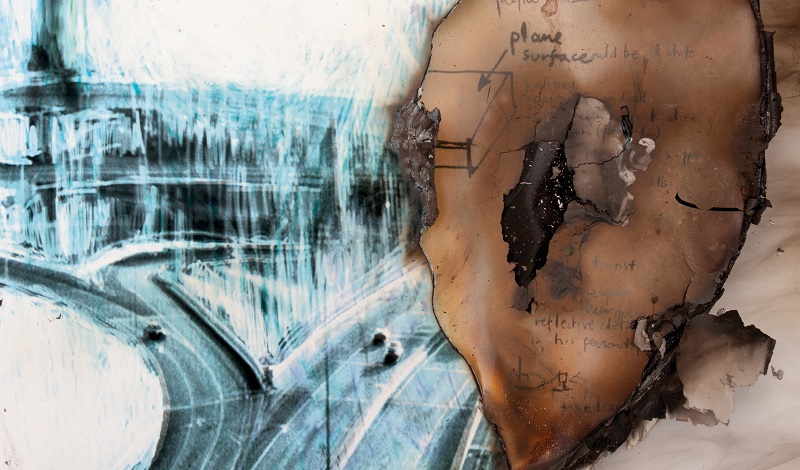
“Palo Alto” is the most over-the-top of the bunch, so much so that Jonny Greenwood’s chugging glam-rock chords seem to be peaking. Seriously, Radiohead have written some damn fine rock songs. It’s maybe more middle of the road for the band, but it doesn’t feel any more commercial than, say, “Karma Police.” And it feels right here, just before another explosion. It’s also just as dark as the album it was cut from “Lift” is a reference to an elevator, and the line “Today is the first day of the rest of your days” is essentially Thom Yorke being bleak as usual, depicting a meaningless existence that drones on and on (buzzes like a fridge?). The band supposedly decided not to release the song because they felt it sounded too commercial, which is probably true when compared to something like “Lucky” or “Paranoid Android.” And it, indeed, is a wonderful little pop song. There’s been much written about “Lift,” a song that Radiohead began playing while on tour with Alanis Morrissette, and much of it feels a bit overblown. Following the bombast of “Pearly,” it feels like a natural transition, and leads to the curious question of why they left it unreleased for 20 years.
#OK COMPUTER RADIOHEAD ALBUM COVERS HOW TO#
It does, however, share a bit in common with Bends-era ballads like “Fake Plastic Trees” and “High and Dry,” its mixture of simple strums and marching drums a stunning exercise in how to turn something so stripped-down into a breathtaking anthem. It almost doesn’t even bear any resemblance to the band that Radiohead became. “I Promise” is a simple, gorgeous little song. It’s a raucous and rich song, and kicks up the tempo and energy after the sunrise of “Lull.” So does “Pearly,” the Suede-like rock ‘n’ roll samba that lived a past life as a “Paranoid Android” b-side.

Sure, “Electioneering” might not be the best song on OK Computer, but then again “Just” fucking smokes. It’s a damn good song, though, and makes for a brief but excellent beginning.įor some reason, Radiohead’s louder rock songs always fare worse in critical evaluations of their work, which doesn’t make a lot of sense to me. Its gradual rise and climax is brighter and poppier than anything on OK Computer for that matter, and almost seems like a glimpse of an alternate history of Radiohead in which they gave into those instincts over their more progressive instincts. And in context, the song feels more connected to the band’s material on 1995’s The Bends than the atmosphere of OK Computer, but that can also be said of most of the b-sides of the era. The shimmering guitar riff of “Lull” simply feels like an album opener. So here’s how our Radiohead OK Computer 2.0 alternate tracklist looks. Unlike most editions of this column, this actually isn’t built from an existing tracklist, but made into one from bits and pieces the band didn’t see fit to include on OK Computer for one reason or another. So let’s see what an entirely different version of Radiohead might release as their third album. But these are still excellent songs, an endlessly replayable counterpoint to the too-serious version of Radiohead that are more about art than writing some fun songs. None of this sounds all that much like the band who, consensus would dictate, released the best album of the ’90s. “Man of War” even pays homage to the music of James Bond-they even submitted the track for consideration in recent Bond entry Spectre, before writing a new song entirely for it (and then losing out to Sam Smith after all that). “Palo Alto” is the Britpoppiest thing they ever did. “Lift” is a fairly conventional, mainstream alternative rock song. The b-sides released during the OK Computer era and the outtakes on last year’s OKNotOK reissue sound more like they belong to the Radiohead of The Bends. And, more fascinatingly, it depicts what sounds a lot like an entirely different band. For one, this isn’t going to be anywhere near as ambitious or transcendent as the original album. Doing so requires an acknowledgement of a couple of facts. Today, we celebrate one of the greatest albums of all-time by making a counterpart record: We’re turning the b-sides from Radiohead’s OK Computer into an entirely new album.

Welcome back to Remake/Remodel, the column where one of Treble’s editors or contributors takes a classic-if imperfect, to our ears-album, and proposes an alternate tracklist in an effort to provide a different, albeit highly enjoyable listening experience.


 0 kommentar(er)
0 kommentar(er)
